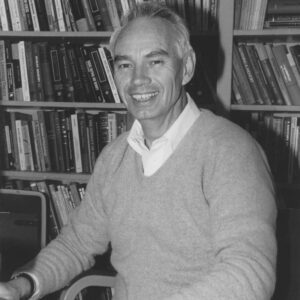Retired professor Howard Gallup died
By Dave Block ’93
Howard Gallup, who taught experimental psychology at Lafayette for 37 years, died on Dec. 18.
 Howard retired in 1995. He was head of the Psychology Department from 1981 to 1993. In 1970 he received Lafayette’s Christian R. and Mary F. Lindback Award for distinguished teaching and contributions to the campus community. He received the Thomas Roy and Lura Forest Jones faculty award for excellence in teaching and research in 1976.
Howard retired in 1995. He was head of the Psychology Department from 1981 to 1993. In 1970 he received Lafayette’s Christian R. and Mary F. Lindback Award for distinguished teaching and contributions to the campus community. He received the Thomas Roy and Lura Forest Jones faculty award for excellence in teaching and research in 1976.
He was the author of the undergraduate textbook Invitation to Modern Psychology.
Howard found the nonprofit ProJeCt of Easton. He played classical piano, was an avid cyclist, and repaired bicycles at Genesis Bicycles in Easton.
Howard was predeceased by his wife of more than 70 years, Frances Platt.
Learn more in his obituary and in these reflections:
Prof. Susan Basow
“What I most remember about Howard was his high energy and enthusiasm. He very much believed in consensus-building for decision making, and that’s how he ran the department when he was chair. He was a passionate believer in self-paced instruction (pre-dating the computer era and current online course offerings), mainly because he believed in student autonomy and mastery. His love of bicycling was legendary.”
Prof. Rob Root
“Howard loved to ride his bike and helped his son and a friend, Tomias Hinchcliff, to found the Genesis Bike Shop that continues to serve the biking needs of the people of Easton. Howard loved to spend time on his bike and in the shop, working on bikes. For over 25 years he rode in the annual ‘Gap Gallop,’ a 100-mile ride sponsored by a local bicycling group. In preparation, he led rides for Genesis every Saturday morning and other times too. The Saturday morning rides were known as ‘Century Rides’ though they never went a full 100 miles; they were just practice for the big ride. These rides were immensely popular, with many regular participants, including me for a few years near the tail end of this tradition.
“Howard was an active member of the Kirkland Village retirement community during almost all of his retirement. His and his wife, Kris, who had died earlier in the year, moved there shortly after his retirement over concerns about her health. They ended up living there for 25 years. Howard enjoyed playing piano concerts that were popular not just with the residents. He was always thinking about his next concert, considering appropriate selections and practicing them. He also was instrumental in the broader music program at the Village, identifying artists who would come and play. He attracted some outstanding performers, some well-known in the Valley, like the Dave Roper Trio, and others with international reputations; I believe that the noted violinist Elizabeth Pitcairn (who plays the famous Red Violin) once played a concert there. Our own Alexis Fisher and Susan Charlton were regulars, and I believe that Skip Wilkins performed once as well.”
Prof. Alan Childs
“Thinking of Howard will always bring a smile to my face. There are few people I have known who pursued all that they did with such joy and enthusiasm. Whether it was teaching his classes, advising students, working on college business, or assembling, repairing, and riding his beloved bicycles, Howard was relentless in his efforts and challenged you to keep up. When I moved to Easton in 1980, Howard showed up at my home to help unload the rental truck. On seeing that I had a bicycle, he challenged me to go on a ride the following weekend, and although I had not been on my bike in a while, he would not take no for an answer. We had a great ride although I lagged well behind despite being 20 years his junior. But he was encouraging and made sure I had a good time. I was more than a bit sore the next day, but that was my introduction to Howard and his many enthusiasms, and the example he would set for the rest of our time together.
“Howard was also studiously informal. He insisted that everyone call him ‘Howard’, even students, and he disliked wearing a coat and tie. His standard work uniform was khaki trousers, a polo shirt, and his favorite canvas lime green loafers. It was easy to spot him in the Commencement Procession at the end of the year because he always wore those shoes. But Howard did not take himself too seriously and was always ready with a smile or a quick laugh to good-natured teasing or a corny joke.
“Howard was committed to social activism and social justice. I always admired his extensive efforts through his work in the community, and he set an example for the rest of us to follow. And Howard did not just participate; he was an active leader in social organizations throughout the Lehigh Valley and left a legacy of volunteerism that continues to this day.
“Finally, I’ll always remember that Howard was a good friend, almost to a fault. It was difficult for him to dislike anyone, although he might dislike their actions or opinions. That would sometimes make it difficult for him to see faults in others, and that could at times leave him vulnerable to the flaws in the rest of us because we did occasionally let him down. But he always forgave and was ready to go back to solving problems if you were willing to work with him.”